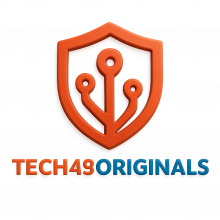
There are 1 Companies in Namibia
that provide Go development Services!
In terms of digital progress, Namibia still struggles with disparities in access to computer technologies in crucial sectors. Even though 60% of Namibians had access to the internet last year, the country’s 2019 network readiness index remains relatively low, ranking 78th out of 139
Discover Top IT Companies in Namibia specialized in Go and other related services. Find the best IT service providers for your projects.
Go, also known as Golang, is an open-source programming language created by Google. It is designed for simplicity, efficiency, and concurrency, making it a versatile choice for building a wide range of applications, from web services to system software.
Handpicked companies • No obligation to hire • 100% risk-free
Explore Top Go development Companies in Namibia
Tech49Originals is a Namibian technology company offering scalable solutions in cybersecurity, software development, web development, and IT hardware.
Services:
Filter Go development Companies in Namibia by Cities
Dive deeper and find the company you need close to you or, from a specific city you prefer. Some of the best companies come from smaller places
Find more Go development companies around the world
TechBehemoths is the world's most advanced and user-friendly platform to match IT Companies with real clients without hustle.
The IT Industry in Namibia: General Portrait
Along the southwest African coast, the Namibian desert covers the country with the same name and places it into a position where tech or IT would have never emerged. But with Chinese investments and national will to face the digital era, Namibia aims towards the most distant goal humanity has in 2021 - space. On June 8, 2021, the Namibian government releases the first-ever space, science and tech policy to empower social and economical changes in the country.
Why you should work with Namibia IT companies
There is probably no logical reason why somewhere from the northern hemisphere would work with an IT company from Namibia. But, the reality shows that the country's potential in the Information and Technology sector is still undervalued, and investments should be made to reveal the country's real capacities. The country has little over 2.5M people, which speaks of a low population density. Despite this, Namibia's literacy is one of the highest in Africa: 91.5%, and combined with its geographical location it could become one of the regions leading tech centres.
What you should pay attention to when working with Namibian IT companies
Namibia is a great safari destination, but so far that's probably one of the few reasons why you would visit this country. Even though with high human potential, Namibia's IT infrastructure does not give any hopes of fast rehabilitation any time soon. Businesses tempted to work with a Namibian tech company don't have too many choices since there are probably no experienced nor talented professionals to face an international project that would bring lots of benefits.
How reliable are Namibian IT companies
The country's tech sector is mainly occupied by Chinese companies that source out for the homeland projects, data and resources. Due to the lack of sustainability, the ICT sector from Namibia is underdeveloped and cannot be rated as reliable or unreliable. Until further development, the country is still a mystery for the majority of the business world.
How does the Namibian IT industry relate to the neighboring countries?
The only and most advanced competitor Namibia has, and should take as a developing model in South Africa. Its close proximity will eventually allow the country's modernization and connection to a wider ICT diversification. Angola or Botswana have little experience and will to develop ICT in the region, and also not eager to share the little experience they have with neighboring countries. In 2021, we witness a diverse but also divided Africa that has other priorities and issues than tech industry development and cooperation in this field
ICT in Namibia in 2022 - perspectives and challenges
As the electricity penetration rate in Namibia increases, 2022 comes with a first development chance for the ICT sector in Namibia. Focus on green electricity and more internet coverage for Namibia are two pillars that may cause new IT companies to emerge earliest at the end of 2022. Meanwhile, the country focuses on other challenges such as access to water, poverty reduction and better living conditions
What is Go and what are its benefits for your projects?
Go, also known as Golang, is an open-source programming language created by Google. It is designed for simplicity, efficiency, and concurrency, making it a versatile choice for building a wide range of applications, from web services to system software.
More than 363 verified IT companies leverage Go in their development projects. These companies range from startups to tech giants like Google, Uber, and Dropbox. They appreciate Go's speed, reliability, and ease of use for building scalable and performant software.
Go service providers rely on various tools and technologies to enhance their development process. Some commonly used tools include the Go compiler, which transforms Go code into executable binaries, and the Go standard library, which offers essential packages for building applications. In terms of deployment, containerization technologies like Docker are frequently used to package Go applications for consistency and portability.
You may be wondering, how is Go Different from C, Rust, and Java. So, below we’ll try to show you more about the differences that exist between them:
-
Go vs. C: While both Go and C are low-level languages, Go offers modern features like garbage collection and memory safety, which simplify programming. Go is also more concise and expressive than C, making it easier to read and maintain. But if you think your business needs companies that also specialize in C, you can find them on this page
-
Go vs. Rust: Rust emphasizes memory safety and control without sacrificing performance. While Go offers simplicity and readability, Rust provides fine-grained control over memory and is suitable for systems programming with a focus on safety.
-
Go vs. Java: Java is a high-level language often used for building enterprise-level applications. It relies on a virtual machine (JVM) and is known for platform independence. Go, on the other hand, compiles native code, offering better performance and efficiency for certain use cases.
Languages related to Go in terms of use cases and features include Python, Ruby, and Node.js. These languages, like Go, are suitable for building web services and backend applications and are known for their developer-friendly features. If you need these programming languages in addition or instead of Go, just click on their corresponding words above to find verified vendors providing those services.
When selecting IT companies that use Go for your project, consider factors such as the company's experience with Go, their portfolio of past projects, client references, and their understanding of your specific project requirements. Look for companies that align with your project's complexity, scalability needs, and budget.
Go service providers are essential for various project types, including:
-
Web Services: Go is well-suited for building RESTful APIs and microservices due to its excellent performance and simplicity.
-
Networking Applications: Go's concurrency support makes it ideal for developing network-related software such as servers and proxies.
-
Cloud Applications: Go's efficiency and speed are valuable for building cloud-native applications and serverless functions.
-
System Software: Go can be used for developing system utilities, command-line tools, and operating system components.
Go is a versatile language, and its speed, simplicity, and efficient concurrency model make it suitable for a wide range of projects, making it an excellent choice for modern software development.
